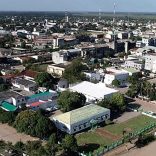Mozambique: INGD inaugurates weather warning system
Mozambique: Illegal mining affects Beira drinking water – AIM report

Artisanal mining in the central Mozambican province of Manica, is affecting the Pungue river, and thus damaging the supply of water for the city of Beira, in the neighbouring province of Sofala, according to a report in Monday’s issue of the Maputo daily “Noticias”.
The drinking water in Beira has now become murky, although Joao Amiel, the Beira director of the government’s Water Supply Assets and Investment Fund (FIPAG), says that so far the situation does not endanger public health.
Because of the high level of turbidity, FIPAG has increased the levels of chlorine it puts in the Beira water supply to purify it. Amiel advised Beira consumers to decant their water before consuming it, but he assured them that the water quality is still within the parameters recommended by the World Health Organisation (WHO).
He added that a complementary factor contributing to the turbidity is the fact that many of the Beira water pipes were installed in 1954. “The infrastructure is completely obstructed”, said Amiel, “and 150 kilometres of the water main from Mutua to Beira are now being replaced”.
Artisanal miners have also been accused of failing to pay their taxes. When the Bank of Mozambique held a meeting of its Consultative Council, in the Manica provincial capital, Chimoio, last week, the chairperson of the Manica Business Council, Samuel Guisado, claimed most of the registered small scale mining companies violate the limits on their production established by law, deceive the inspection and customs bodies, and fail to pay the due amount of tax.
These mining companies, he said, do not declare their real production. They are involved in tax evasion, the smuggling of minerals, and acts of corruption that allow foreigners to enter the country to buy and export precious minerals illicitly.
Celso Maconzo, representing a legitimate gold mining company, Explorador Ltd., said that some of the companies registered as “small scale”, are in fact producing on a large scale. They only declare small amounts of ore mined, in order to avoid paying taxes, and sell most of their production clandestinely to foreigners.
Artisanal mining also damages agriculture. Guisado said that many investors have abandoned agricultural projects in Manica, because the methods used by the artisanal miners impoverish the soil, pollute the rivers and increase erosion.
Romao Gemo, of the Vanduzi Company, which exports vegetables to Europe, warning of the damaging impacts of artisanal mining, supported Guisado, pointing out that pollution of the rivers is making irrigation impossible.













Leave a Reply
Be the First to Comment!
You must be logged in to post a comment.
You must be logged in to post a comment.